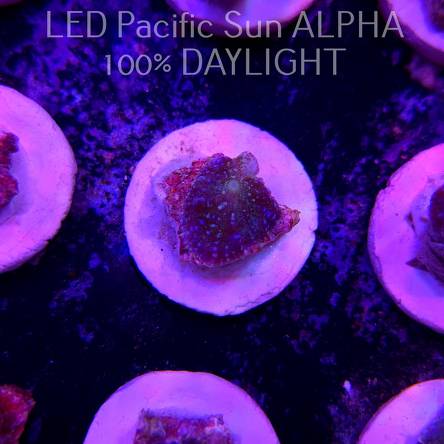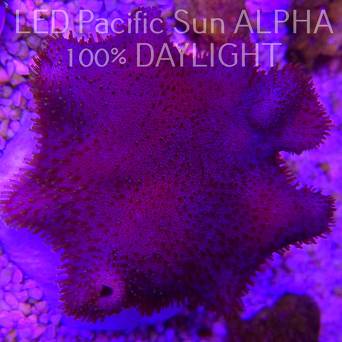Rhodactis BLUE GREEN MOUTH (23.09.2024)
- Manufacturer: JadwigaMorska
-
Availability:
 None
(0 pcs.)
None
(0 pcs.)
- pcs.
- €44.45
Soft corals are a group of coral organisms that encompass many different species, such as leather corals (from the genus Sarcophyton) and mushroom corals (from the genus Actinodiscus). Here is a general description of soft coral cultivation:
-
Aquarium:
Selecting the right aquarium is a crucial step in soft coral cultivation. The aquarium should be sufficiently large to provide stable water conditions. A tank with a capacity of at least 75 liters is recommended for beginner cultivators.
-
Water Parameters:
Soft corals require stable and high-quality water conditions. The water temperature should range from 24°C to 26°C, with a pH level between 8.1 and 8.4. The salinity level (specific gravity) should be around 1.025.
-
Lighting:
Appropriate lighting is essential for the photosynthesis of soft corals. The aquarium should be equipped with suitable LED or halogen lighting that provides an adequate amount of light.
-
Filtration:
The filtration system should be well-suited to the needs of soft corals. It is recommended to use mechanical filtration and include white sand or gravel at the bottom of the tank.
-
Water Flow:
Soft corals require moderate water flow. You can use a wave pump or other devices to create water movement in the aquarium.
-
Feeding:
Soft corals primarily feed through photosynthesis, but they can also capture small particles from the water. It is advisable to provide them with proper lighting for photosynthesis and feed them with marine plankton or other microorganisms.
-
Species-Specific Requirements:
It's important to note that different species of soft corals may have slightly different requirements regarding cultivation conditions, lighting, and water flow. Therefore, it's important to understand the specific needs of the species you intend to cultivate.
-
Monitoring and Maintenance:
Regularly monitor water parameters to ensure stability. Removing excess algae and performing partial water changes helps maintain good conditions.
-
Reproduction:
Some species of soft corals can be propagated through division or budding. This is a more advanced technique and requires specialized knowledge.
-
Challenges:
Cultivating soft corals can be challenging, especially for novice aquarium enthusiasts. Patience, a systematic approach, and learning from mistakes are important factors for success.
Soft corals are beautiful and fascinating organisms that can enhance the beauty of your marine aquarium. However, successful cultivation requires time, effort, and a good understanding of their specific needs.
Benefits of Buying Corals from Aquarium Cultivation:
Aquarium coral cultivation has become increasingly popular in the world of aquarium enthusiasts for several important reasons. Here are some advantages of purchasing corals from aquarium cultivation:
-
Protection of Natural Coral Reefs:
-
One of the primary benefits is that corals cultivated in aquariums are not harvested from wild coral reefs. This means that you are not contributing to the destruction of natural marine ecosystems.
-
-
Sustainable Aquaculture:
-
By buying corals from cultivation, you support sustainable aquaculture, which is more environmentally friendly than harvesting corals from wild reefs. This contributes to the preservation of marine biodiversity.
-
-
Greater Availability and Variety:
-
Aquarium cultivators often offer a wider range of coral species and varieties, allowing aquarium enthusiasts to create more diverse and interesting ecosystems in their tanks.
-
-
Healthier and Less Prone to Disease:
-
Corals from cultivation are typically healthier and less susceptible to diseases compared to those harvested from wild reefs. Aquarium cultivators often conduct regular testing and care for their corals, preventing diseases.
-
-
Proper Cultivation Conditions:
-
Coral cultivators control and maintain stable water conditions, ensuring optimal lighting, water flow, and nutrient levels. This promotes healthy growth and vibrant colors in corals.
-
-
Support for Enthusiasts:
-
Aquarium cultivators often offer support and advice, which can be particularly helpful for novice aquarists. You can gain valuable insights into coral care and cultivation from experienced cultivators.
-
-
Safe and Legal Alternative:
-
When you purchase corals from aquarium cultivation, you avoid potentially illegal trade in wild corals, which can lead to the degradation of natural coral reefs.
-
-
Supporting Scientific Innovation:
-
Aquarium cultivators often engage in research related to coral conservation and reef restoration. By buying from them, you also support these innovative scientific efforts.
-
Buying corals from aquarium cultivation is a sustainable and ethical way to own beautiful corals in your aquarium. It is also a means of engaging in the protection of marine nature and preserving wild coral reefs for future generations.







